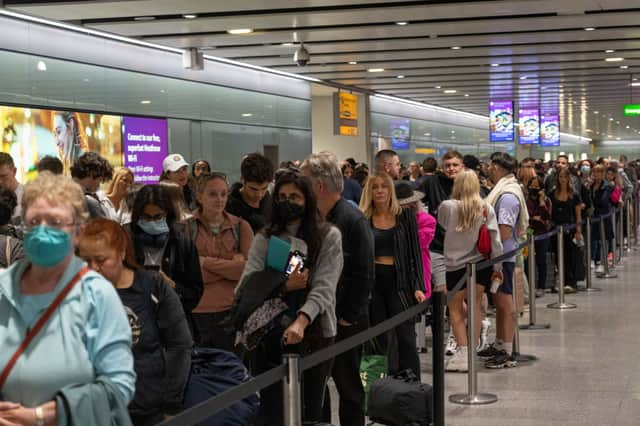Brexit: travellers warned about EU passport rule change later this year which may cause queues and disruption
and live on Freeview channel 276
Britons booking holidays later this year have been warned about an important post-Brexit passport change which could cause queues and disruption.
From the autumn, any visitor from outside the EU will have to give sensitive biometric data at the border as part of the new Entry-Exit System (EES), including facial scans and fingerprints. This will then be stored on a database and verified on each subsequent visit.
Advertisement
Hide AdAdvertisement
Hide AdThe new system, which has been repeatedly delayed, is a substantial increase in admin for travellers post-Brexit, and comes ahead of the £6 visa-waiver charge in 2025. Travel experts have warned of long delays, particularly at ports and Eurostar terminals where space is restricted. Bosses at the Channel Tunnel estimate processing time for cars will rise from one minute to between five and seven minutes, and French public finance watchdog Cour des Comptes has said that queuing times at the border could double or even triple.
What are the new EU passport rules?
The Entry-Exit System is an automated registration system for UK holidaymakers - who don’t require a visa. It is designed to root out travellers who overstay the current 90-day limit.
It was initially slated to launch in 2022, but has faced multiple setbacks. The EU Council said earlier in the year: “The new roadmap for the delivery of the new IT architecture foresees that the Entry/Exit System will be ready to enter into operation in autumn 2024.” The Independent reported that it will be launched on 6 October next year, although this hasn’t been confirmed.
It will replace the much-loved stamps that Britons are currently getting on their passports after Brexit. Travellers will need to have their fingerprints and a facial biometric taken, and scan their passports every time they enter the EU.
Advertisement
Hide AdAdvertisement
Hide Ad

What have experts said about queues and delays?
Experts have told NationalWorld that holidaymakers should be wary of queues and delays if travelling later in the year. Luke Petherbridge, director of public affairs from ABTA, the trade association of travel agents, said: “This should in the longer-term make the process of entering and leaving the Schengen zone more straightforward for UK travellers.
“However, initial registration will require additional checks, such as facial scans and fingerprints, and this has the potential to increase border processing times and cause queues when travelling for the first time post-implementation. As such, we need to see work done to facilitate some of these checks prior to arrival at the border to ensure that these changes are introduced as smoothly as possible.”
While Eurostar, which runs trains to Paris, Brussels and Amsterdam from London St Pancras, said it has spent €10 million on preparing for the changes. A spokesperson said: “We are working closely with the authorities in the UK and EU member states, as well as with our stations, to prepare for the arrival of EES.
"Our aim is to minimise the impact on our customers to ensure the smoothest possible travel experience and the detailed work required to achieve this has been underway for some time.
Advertisement
Hide AdAdvertisement
Hide Ad"We have been working proactively on projections to accurately assess our needs across all stations. As a result, we plan to install around 65 pre-check-in kiosks in our terminals at St Pancras in London and Gare du Nord in Paris. We are also significantly reinforcing border control capacity with additional manual booths and electronic gates at both stations.”
The CEO of Port of Dover, Doug Bannister, said it will cause "significant and continued disruption for a very long time".
Delays are ‘only going to get worse’
Candice Mason, of Masons Minibus & Coach Hire Ltd, who described the scenes at Dover over the last few years "as carnage", has warned that in 2024 queues are only likely to get worse. "They already don't have the infrastructure just to check passports, so I don't know how they are going to do thumb and facial checks," Candice said. "They don't have the manpower, they don't have the space for it all to happen. It's definitely going to cause delays.
She explained that schools have told they're going to stop using coaches because of the chaos, and other companies are stopping arranging European travel. "All of us have had problems around the year, particularly around those peak seasons, it's gotten worse," she said. “Already coaches are missing ferries due to increased passport checks and drivers are using up their legal driving hours waiting in queues. And that's before the additional regulations come in.”
Advertisement
Hide AdAdvertisement
Hide AdPhil Smith, from the Confederation of Passenger Transport UK, said: "The problem is that the Port of Dover, the Eurotunnel and Eurostar have got a fairly restricted amount of space to install the infrastructure, and this will determine how quickly people get through. The first year we have to manage it, it's going to take considerably longer than at the moment. We don't know how the Port of Dover are going to be able to handle it."
Ralph Blackburn is NationalWorld’s politics editor based in Westminster, where he gets special access to Parliament, MPs and government briefings. If you liked this article you can follow Ralph on X (Twitter) here and sign up to his free weekly newsletter Politics Uncovered, which brings you the latest analysis and gossip from Westminster every Sunday morning.
Comment Guidelines
National World encourages reader discussion on our stories. User feedback, insights and back-and-forth exchanges add a rich layer of context to reporting. Please review our Community Guidelines before commenting.
